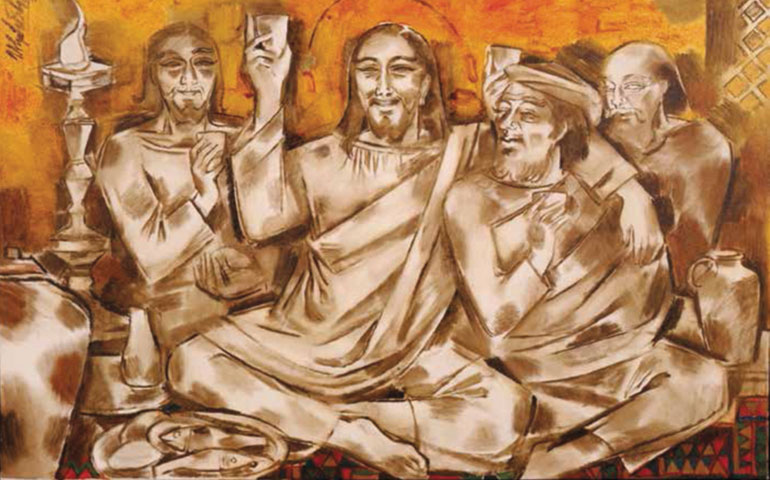
“The First Supper” by Alphonso Doss (Courtesy of the MIAT Foundation)
"If we couldn't laugh, we would all go insane."
Jimmy Buffett sang that line, not me, but I get it. I never sang, "Stop the world and let me off!" either. That was Patsy Cline. But I've said it a lot, and I bet you have, too.
When "the world is too much with us," we just want to crawl under the covers and pretend we're not there. I've done that, too. A saner response than pretending to disappear is what the '60s trailblazer Otter called for in "Animal House": "a really stupid and futile gesture." There is a time to weep and a time to laugh and a time to do something completely different.
One day when my friend Art Fagan and I were priests at a home for children who were wards of the state, we had just finished a big lunch of meatloaf and mashed potatoes and had to run out and gather baseball equipment and organize three different games and chase scamps and be coaches and cheerleaders. We were exhausted from a stretch of 18-hour days. We trudged to the staircase leading downstairs, but instead of walking down, we lay down and rolled down the 30 steps like stuntmen playing dead. The staircase of the old manse was as wide as the one in Gone With the Wind and when we got to the bottom, our colleague Fr. John Smyth, who had just come in, didn't say a word but just walked over us. We got up, laughed and went back to our world refreshed.
Jesus had an even better way to stop the world and get off. Hounded by paparazzi, he jumped into a boat and rowed to deep water, where he sat under the stars and listened to God. He returned the next day and told his disciples, "You know, it's easier for a camel to get through the eye of a needle than for a man with baggage to enter the kingdom of heaven." They got the joke, and everyone laughed.
The Gospels tell us that Jesus wept, but never that he laughed. But the mirth is there, smiling at us between the lines. You don't get invited to as many parties as Jesus did unless you're enjoyable to be with. The artist Alphonso Doss says of his painting "The First Supper," "When I saw 'The Last Supper' by Leonardo, I thought about the first supper and imagined how the situation would have been. I was sure that as Christ was human and divine he must have had the quality of humor and wit in him and would have shared his happiness with his followers."
Jesus appreciated the humor in the human condition. When Peter tried to walk on water like Jesus did but sunk like a crosier, you can imagine Jesus and the others laughing as they pulled their soaked friend back into the boat. When Jesus raised Lazarus from the dead, you can see Lazarus and Jesus with him, hugging and laughing until they cried. And when Jesus rose from the dead and met two friends who didn't recognize him, he said, "Let's eat!" They recognized him only in the breaking of bread. Can you imagine how heartily Jesus laughed?
Jesus was the Son of God and never took himself seriously.
We spend our whole lives taking ourselves seriously, trying to do everything ourselves, trying to be somebody, climbing ladders to get ahead. Sooner or later we discover that the human joke is on us, that the life we've spent decades making up, grand or meager, is a sham and we want to scream. We've got to see the mock in the soap operas we make or go insane.
How did it get this way?
A Course in Miracles tells us: "Into eternity, where all is one, there crept a tiny, mad idea, at which the son of God remembered not to laugh." We are all the sons and daughters of God. The "tiny, mad idea" is that we are not, that we are separate from God and from each other. Jesus came to teach us that we are not human beings trying to be spiritual but spiritual beings pretending to be human. Therein lays the madness, and the pain. The next time you can't stand it anymore and want to stop the world and get off, go do something stupid with a friend and laugh. Or better yet, sit in stillness under the stars. The human condition is just a phase you're going through -- you'll get over it.
[Michael Leach is editor at large for Orbis Books.]

